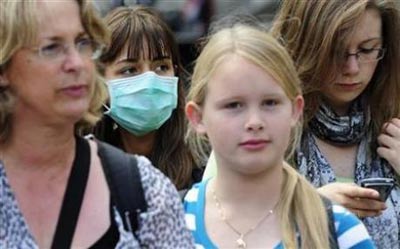|
 A girl wears a face mask as she walks along Whitehall in London, July 30, 2009. (Agencies) |
|
Fearful parents are saying no to sleep-overs, banning children as old as 15 from using public transport on their own and watching over their kids like hawks at the local park, according to a new British study. The survey of 6,099 people commissioned by LV= Streetwise, a charity that educates children about safety, revealed that nearly a quarter of children aged 15 or under were not allowed to sleep at a friend's house, 60 percent were forbidden to travel on public transport alone and 43 percent can't go to the park without a parent or guardian. It said more than 60 percent of mums and dads think the world is more dangerous than when they were kids. "It's difficult for parents to know when is the right time to step back and allow children to experience things on their own, and this report shows just how much things have changed over the last generation," said LV= group chief executive Mike Rogers in a statement. In contrast, just four percent of today's adults say they were banned from sleeping-over when they were 15 or younger, only two percent were forbidden to use public transport, and the same number couldn't go out on their own in familiar surroundings, such as their local town or park. "Stranger danger" is the number one worry for over half of all parents (54 percent), followed by bullying (47), mugging (47) and road danger (34). On average, children today can look forward to walking to school on their own by the age of 11, use public transport on their own at 12, and babysit their brother or sister by the time they're 14. In contrast, parents say they were allowed to walk to school unaccompanied at the age of nine, use public transport alone by the time they were 11, and babysit a sibling by the time of their 12th birthday. Parents know they are being tougher on their children and over a third said they felt uneasy that their kids do not get the same opportunities as they did to experience freedom as a youngster. LV= Streetwise released the survey to launch its safety roadshow, which helps to educate children about safety in the home and outdoors. (Read by Renee Haines. Renee Haines is a multimedia journalist at the China Daily Web site.) (Agencies) |
英國(guó)一項(xiàng)最新調(diào)查表明,英國(guó)父母因擔(dān)心孩子的安全問(wèn)題,不讓孩子在外過(guò)夜,不讓年齡不滿15歲的子女單獨(dú)乘坐公共交通工具,而且在帶孩子到公園玩時(shí)會(huì)像老鷹一樣緊緊地盯著他們。 這項(xiàng)由LV= Streetwise兒童安全教育慈善組織委托開(kāi)展的調(diào)查共有6099人參加。調(diào)查顯示,在15歲或15歲以下的兒童中,近四分之一的孩子被禁在朋友家過(guò)夜,60%的孩子不準(zhǔn)單獨(dú)乘坐公共交通工具,43%的孩子在沒(méi)有父母或監(jiān)護(hù)人的陪同下不能單獨(dú)去公園。 調(diào)查稱,超過(guò)60%的父母認(rèn)為,如今的社會(huì)環(huán)境不如他們小時(shí)候安全。 LV=Streetwise組織的首席執(zhí)行官麥克?羅杰斯在一份聲明中說(shuō):“對(duì)于父母來(lái)說(shuō),何時(shí)選擇退后一步,讓孩子們單獨(dú)去經(jīng)歷一些事情是很難的。該報(bào)告顯示出在過(guò)去一代中,有多少事情發(fā)生了變化。” 相比之下,只有4%的父母稱在他們15歲時(shí)或更小的時(shí)候不能在外過(guò)夜,只有2%的人在那個(gè)年齡被禁止單獨(dú)乘坐公共交通工具,同等數(shù)量的人稱他們當(dāng)時(shí)不能單獨(dú)去當(dāng)?shù)氐某擎?zhèn)或公園等熟悉的環(huán)境。 一半以上的父母(54%)最擔(dān)心(孩子遇到)“來(lái)自陌生人的危險(xiǎn)”,其次是受到欺負(fù)(47%),遭搶劫(47%)和道路安全問(wèn)題(34%)。 一般來(lái)說(shuō),如今的孩子11歲時(shí)可以自己走路去上學(xué),12歲時(shí)能單獨(dú)乘坐公共交通工具,14歲的時(shí)候能幫忙照看弟弟妹妹。 而父母一代的人在他們9歲時(shí)就能自己走路去上學(xué),11歲時(shí)就可以單獨(dú)乘坐公共交通工具,12歲時(shí)就能 幫忙照看弟弟妹妹。 父母?jìng)冎垃F(xiàn)在他們對(duì)自己的孩子看得更嚴(yán)。超過(guò)三分之一的父母說(shuō),自己的孩子不能像他們小時(shí)候那樣享受自由,這也讓他們感到擔(dān)心。 LV= Streetwise機(jī)構(gòu)開(kāi)展這一調(diào)查是為了宣傳他們即將開(kāi)始的兒童安全教育巡展,該巡展旨在為對(duì)兒童進(jìn)行在家中和戶外的安全教育提供幫助。 相關(guān)閱讀 英國(guó):兒童性早熟 家長(zhǎng)多擔(dān)憂 (中國(guó)日?qǐng)?bào)網(wǎng)英語(yǔ)點(diǎn)津 陳丹妮 編輯蔡姍姍) |
|
Vocabulary: sleep over: to stay the night at somebody else's home 在別人家里過(guò)夜 roadshow: 巡展;路演 |
